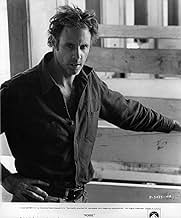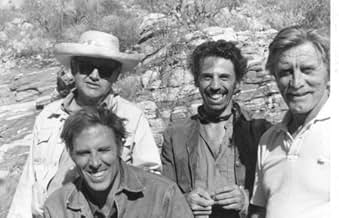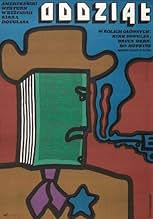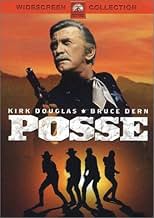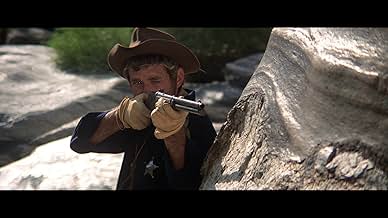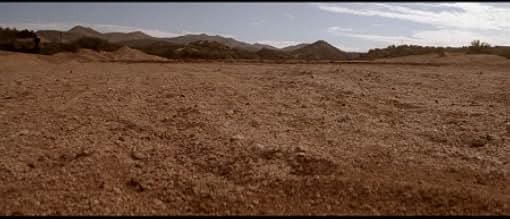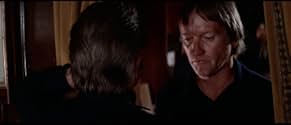AVALIAÇÃO DA IMDb
6,5/10
2,6 mil
SUA AVALIAÇÃO
Segue um representante da lei com aspirações políticas, que acha que para chegar ao senado deve capturar o notório bandido Jack Strawhorn. Com esperança de receber apoio da imprensa e do pov... Ler tudoSegue um representante da lei com aspirações políticas, que acha que para chegar ao senado deve capturar o notório bandido Jack Strawhorn. Com esperança de receber apoio da imprensa e do povo.Segue um representante da lei com aspirações políticas, que acha que para chegar ao senado deve capturar o notório bandido Jack Strawhorn. Com esperança de receber apoio da imprensa e do povo.
- Direção
- Roteiristas
- Artistas
- Prêmios
- 1 indicação no total
William H. Burton
- McCanless
- (as Bill Burton)
Avaliações em destaque
One thing about Kirk Douglas is that he's never been afraid to let the public see him as a bad guy. It's a great tribute to his ability as an actor to develop such a wide range of characters from the heroic Spartacus to the villainous George Brougham in The List of Adrian Messenger.
Posse falls somewhere in the middle of those two films in terms of the good versus evil scale for Kirk Douglas. Politicians running on "law and order" platforms were just coming into vogue at the time and this western is spot on about those kind of politicians and the motivations behind them.
Kirk Douglas is a U.S. Marshal with political ambitions to be a United States Senator. He's got his photographer with him to record his exploits and travels on a private railroad car provided by the railroad.
He's on the trail of outlaw Jack Strawhorn, played by Bruce Dern. Before capturing Strawhorn, Douglas and his posse burn alive Dern's gang in a barn fire and then butcher another group of misfits he's put together even as they want to surrender.
What I like most about Posse is that it doesn't try to make Dern out any kind of a hero. He's an outlaw the way some people are grocers, bakers, shoemakers, etc. This may very well have been Bruce Dern's best screen role.
It turns out that Dern is a far better judge of human nature than the fatuous Douglas is. The town of Tesota, Texas where most of the action takes place is very much sadder and wiser when the film concludes.
A lot of the same themes are covered in the more acclaimed The Unforgiven with Clint Eastwood who also starred and directed himself. But I think Kirk Douglas got there first.
Posse falls somewhere in the middle of those two films in terms of the good versus evil scale for Kirk Douglas. Politicians running on "law and order" platforms were just coming into vogue at the time and this western is spot on about those kind of politicians and the motivations behind them.
Kirk Douglas is a U.S. Marshal with political ambitions to be a United States Senator. He's got his photographer with him to record his exploits and travels on a private railroad car provided by the railroad.
He's on the trail of outlaw Jack Strawhorn, played by Bruce Dern. Before capturing Strawhorn, Douglas and his posse burn alive Dern's gang in a barn fire and then butcher another group of misfits he's put together even as they want to surrender.
What I like most about Posse is that it doesn't try to make Dern out any kind of a hero. He's an outlaw the way some people are grocers, bakers, shoemakers, etc. This may very well have been Bruce Dern's best screen role.
It turns out that Dern is a far better judge of human nature than the fatuous Douglas is. The town of Tesota, Texas where most of the action takes place is very much sadder and wiser when the film concludes.
A lot of the same themes are covered in the more acclaimed The Unforgiven with Clint Eastwood who also starred and directed himself. But I think Kirk Douglas got there first.
Well, not 'the best', perhaps, but an interesting and stylish western starring Kirk Douglas, who also produced and directed it. Bruce Dern is great as Strawhorn, the bad guy who ends up stealing the show.
Howard Nightingale is running for a seat in the US Senate. He is a man of great complexity, and one trait very much to the fore in his personality is a ruthless desire to impress the voters. He has assembled a posse of rangers, his own personal uniformed army of crimebusters. Nightingale (played by Douglas) has calculated that he can win the election on a clear-the-territory-of-lowlifes ticket. He and his posse are hunting down Strawhorn, and have fitted out a crusade train for the purpose of capturing their prey. The plan is to grab Strawhorn and hang him just in time for the election.
Nightingale is in the pocket of the railroad owners. The local newspaper is the Tesota Sentinel, and one of the film's themes is the valuable role played by the press in speaking truth to those in power. One-armed, one-legged journalist Harold Hellman (played by James Stacy, who had recently lost both limbs on a motor cycle accident) is the equal of the photogenic wannabe Senator. Nightingale works the crowd with glib words, but his position is being eroded by a different formula of words - that used by The Sentinel.
One of the film's elegant touches is the photography motif. At various points in the story, the participants pose to have their picture taken, and the resulting stills form a freeze-frame chronicle of the action. A lot of post-production work went into dubbing extraneous voices onto the soundtrack, so that the crowd scenes are laced with apposite little remarks.
A violently-burning train provides terrific visuals, as well as offering acerbic comment on Nightingale's political aspirations. The film's concluding message, that by its nature a standing army is a threat to democracy, is well made - as is the point about the fickleness of public opinion.
Verdict - A clever, enjoyable little western.
Howard Nightingale is running for a seat in the US Senate. He is a man of great complexity, and one trait very much to the fore in his personality is a ruthless desire to impress the voters. He has assembled a posse of rangers, his own personal uniformed army of crimebusters. Nightingale (played by Douglas) has calculated that he can win the election on a clear-the-territory-of-lowlifes ticket. He and his posse are hunting down Strawhorn, and have fitted out a crusade train for the purpose of capturing their prey. The plan is to grab Strawhorn and hang him just in time for the election.
Nightingale is in the pocket of the railroad owners. The local newspaper is the Tesota Sentinel, and one of the film's themes is the valuable role played by the press in speaking truth to those in power. One-armed, one-legged journalist Harold Hellman (played by James Stacy, who had recently lost both limbs on a motor cycle accident) is the equal of the photogenic wannabe Senator. Nightingale works the crowd with glib words, but his position is being eroded by a different formula of words - that used by The Sentinel.
One of the film's elegant touches is the photography motif. At various points in the story, the participants pose to have their picture taken, and the resulting stills form a freeze-frame chronicle of the action. A lot of post-production work went into dubbing extraneous voices onto the soundtrack, so that the crowd scenes are laced with apposite little remarks.
A violently-burning train provides terrific visuals, as well as offering acerbic comment on Nightingale's political aspirations. The film's concluding message, that by its nature a standing army is a threat to democracy, is well made - as is the point about the fickleness of public opinion.
Verdict - A clever, enjoyable little western.
Kirk Douglas had already directed the somewhat terrible Scalawag in 1973, but that previous flop did not deter him from having a second stab at the directing job a couple of years on. Fortunately, Posse is a much more accomplished film than Scalawag in every way: Douglas's own direction is more assured, the script by Christopher Knopf and William Roberts is very literate and clever, and Fred Koenekamp's cinematography has a good, professional look about it. By 1975, one would have thought that there would be little mileage left in the western genre. It seemed that nothing new could be done, but this one comes up with a fresh twist by having the "hero" gradually revealed as an unlikable and ambitious social climber.
Marshal Howard Nightingale (Douglas) publicly announces that he will bring in infamous railroad bandit Jack Strawhorn (Bruce Dern). Although Strawhorn is a criminal of considerable notoriety - and definitely a man who belongs behind bars - Nightingale has an ulterior motive for apprehending his man. For the good Marshal has decided to run for the Texan senate, and believes that if he can nail Strawhorn - painting himself as a hero into the bargain - he will win over plenty of voters. Gradually, more and more people begin to see through Nightingale's selfish and egotistical political plans. His own posse have their doubts about how they will figure in the Marshal's future schemes; a news editor named Hellman (James Stacy) expresses distrust over the Marshal's ludicrously self-important opinion of himself; even Strawhorn eventually realises what his sly adversary is up to. Ultimately, Nightingale loses his posse and his public favour, with a little clever intervention from Strawhorn, and sees his political dreams left in tatters.
The critical response to Posse was much more favourable than Douglas's previous directing attempt, and deservedly so. The western action in the film is good, solid stuff, not too violent (as was the trend in '75), but certainly tough enough to satisfy genre addicts. Douglas gives a strong performance as the absurdly self-obsessed marshal, and Dern is even better as the charismatic, even likable, bandit. The subversive nature of the plot (hero gradually turns out to be villain, villain gradually turns out to be hero) is intriguing and fairly fresh, and helps to add interest to the film. While Posse has occasional lulls, and a few noticeably amateurish performances lower down the cast list, it remains a fresh, interesting, and intriguing addition to a virtually exhausted genre.
Marshal Howard Nightingale (Douglas) publicly announces that he will bring in infamous railroad bandit Jack Strawhorn (Bruce Dern). Although Strawhorn is a criminal of considerable notoriety - and definitely a man who belongs behind bars - Nightingale has an ulterior motive for apprehending his man. For the good Marshal has decided to run for the Texan senate, and believes that if he can nail Strawhorn - painting himself as a hero into the bargain - he will win over plenty of voters. Gradually, more and more people begin to see through Nightingale's selfish and egotistical political plans. His own posse have their doubts about how they will figure in the Marshal's future schemes; a news editor named Hellman (James Stacy) expresses distrust over the Marshal's ludicrously self-important opinion of himself; even Strawhorn eventually realises what his sly adversary is up to. Ultimately, Nightingale loses his posse and his public favour, with a little clever intervention from Strawhorn, and sees his political dreams left in tatters.
The critical response to Posse was much more favourable than Douglas's previous directing attempt, and deservedly so. The western action in the film is good, solid stuff, not too violent (as was the trend in '75), but certainly tough enough to satisfy genre addicts. Douglas gives a strong performance as the absurdly self-obsessed marshal, and Dern is even better as the charismatic, even likable, bandit. The subversive nature of the plot (hero gradually turns out to be villain, villain gradually turns out to be hero) is intriguing and fairly fresh, and helps to add interest to the film. While Posse has occasional lulls, and a few noticeably amateurish performances lower down the cast list, it remains a fresh, interesting, and intriguing addition to a virtually exhausted genre.
U.S Marshal Howard Nightingale is a man who has big political aspirations and to achieve this dream. He and his posse of deputies go after an out-law Jack Strawhorn. When Nightingale captures Strawhorn, just like his other captors or conquests he exploits it through the media for public support. Strawhorn would be Nightingale's ticket into the US senate, but Strawhorn thinks otherwise.
Can westerns be too low-key? 'Posse' felt so. Kirk Douglas directs and stars in this understated, but thoroughly ambitious under-the-radar western that had something cynical to say when it came to its closing credits. Quite heavy-handed and aware of its messages (money buys loyalty with the guys donning their badges being no better than the outlaws and representing an image (the people's?) to manipulative achieve a politically upper-hand), but the story's format is just so odd and subversive. The western conventions are there, but by the end William Roberts and Christopher Knopf's cleverly sharp (if sly) material basically turned it upside down with an ironic turn of events. It has that fragrance of the pioneer Hollywood westerns, but its punishing violence and sexual inclusions with a quiet, but powerful conclusion roots it in the 70s. The unusual theme to it and the effortlessly collected and cool-witted performances of Kirk Douglas and Bruce Dern (who shared a terrific chemistry) cover for how mechanical the film did look. Nothing totally skillful or stylish about it. Douglas' direction is raggedly rough and a little too plain. However some action shootouts and chase sequences were competently entertaining, but when the violence did hit, it wasn't presented in such a meaningless parade. It went hand-to-hand with the thoughtful nature of the script. Dick O'Neill's taut, but at times flashy photography is fluidly shot and Maurice Jarre's uncanny score is strongly delivered. Supporting Douglas and Dern (who's character's made great for sparing confrontations) is excellent performances by Bo Hopkins, James Stacy, Beth Brickell, Dick O'Neill and Alfonso Arau. A western that's too interesting to pass up because of the calculating tone lurking underneath.
Can westerns be too low-key? 'Posse' felt so. Kirk Douglas directs and stars in this understated, but thoroughly ambitious under-the-radar western that had something cynical to say when it came to its closing credits. Quite heavy-handed and aware of its messages (money buys loyalty with the guys donning their badges being no better than the outlaws and representing an image (the people's?) to manipulative achieve a politically upper-hand), but the story's format is just so odd and subversive. The western conventions are there, but by the end William Roberts and Christopher Knopf's cleverly sharp (if sly) material basically turned it upside down with an ironic turn of events. It has that fragrance of the pioneer Hollywood westerns, but its punishing violence and sexual inclusions with a quiet, but powerful conclusion roots it in the 70s. The unusual theme to it and the effortlessly collected and cool-witted performances of Kirk Douglas and Bruce Dern (who shared a terrific chemistry) cover for how mechanical the film did look. Nothing totally skillful or stylish about it. Douglas' direction is raggedly rough and a little too plain. However some action shootouts and chase sequences were competently entertaining, but when the violence did hit, it wasn't presented in such a meaningless parade. It went hand-to-hand with the thoughtful nature of the script. Dick O'Neill's taut, but at times flashy photography is fluidly shot and Maurice Jarre's uncanny score is strongly delivered. Supporting Douglas and Dern (who's character's made great for sparing confrontations) is excellent performances by Bo Hopkins, James Stacy, Beth Brickell, Dick O'Neill and Alfonso Arau. A western that's too interesting to pass up because of the calculating tone lurking underneath.
Bet you didn't know that Kirk Douglas took the director's chair a couple of times, POSSE being one of them. If you like westerns, like me, you'll probably find this decent. The movie does suffer from the middle third of the movie, where the story pretty much grinds to a halt. Though this part wasn't really boring, it will probably make you wish they would get on with it. Also, the actions taken by certain characters near the end, though having some justification, didn't seem to have enough justification.
On the positive side, POSSE is well shot, well acted, good production values, and an interesting ending. It's worth seeing.
P.S. - Leonard Maltin's description of this movie isn't exactly how the movie plays.
On the positive side, POSSE is well shot, well acted, good production values, and an interesting ending. It's worth seeing.
P.S. - Leonard Maltin's description of this movie isn't exactly how the movie plays.
Você sabia?
- CuriosidadesThis movie was the first role for James Stacy following his 1973 motorcycle accident in which he was hit by a drunk driver, resulting in the loss of his left arm and left leg. Kirk Douglas created the role especially for Stacy.
- Erros de gravaçãoUS Senators were not directly elected at the time of the film's setting. They were appointed by State Legislatures until the 17th Amendment in 1913.
- Citações
Jack Strawhorn: Every day above ground is a good day.
- ConexõesReferenced in Talking Pictures: Allan Warnick, Supporting Actor in 'Chinatown' (2022)
- Trilhas sonorasI've Been Working on the Railroad
(uncredited)
Traditional
The first line is sung during Nightingale's speech
Principais escolhas
Faça login para avaliar e ver a lista de recomendações personalizadas
- How long is Posse?Fornecido pela Alexa
Detalhes
Bilheteria
- Orçamento
- US$ 2.000.000 (estimativa)
Contribua para esta página
Sugerir uma alteração ou adicionar conteúdo ausente

Principal brecha
By what name was Ambição Acima da Lei (1975) officially released in India in English?
Responda

